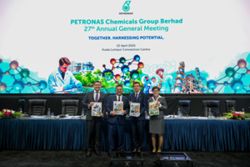KOTA KINABALU: The delays in Sabah's Ulu Padas Hydro Project are not the fault of a single company but stem from multiple factors, the state assembly was told.
Chief Minister Datuk Seri Hajiji Noor cited equity and share transfers, the need for due diligence, a special environmental impact assessment study, as well as the Covid-19 pandemic as among the reasons.
During question and answer time on Monday (April 14), Datuk Seri Bung Moktar Radin (BN-Lamag) had asked the state to explain why the company concerned, with the most equity in the project, was allowed to continue with it despite failing to complete the job after 10 years.
He said companies that failed to fulfil their obligations should have their contracts terminated, and not allowed to renew or continue.
Hajiji explained that the company concerned had not failed, but the project was hindered by factors such as procedures, the pandemic, and equity transfers.
Hajiji said that in 2015, Putrajaya had given a conditional offer letter to the company concerned, Kerjaya Kagum Hitech JV Sdn Bhd, with an equity share of 60% in the project.
Sabah Electricity Sdn Bhd (SESB) held 20% equity and the state government held the remaining 20%, he added.
However, SESB had rejected its shares in 2016, and the state appointed Sabah Energy Corporation to hold this equity through a special-purpose vehicle, Upper Padas Power Sdn Bhd, he said.
Ultimately, Hajiji said, other share transfers over the years left Kerjaya Kagum with only 15% of the total shares within Upper Padas Power.
“The rest are owned by Gamuda Berhad at 45% and Sabah Energy Corporation, a wholly-owned company, with 40%," he explained.
Hajiji said that as the majority shareholder, Gamuda was appointed the main developer to lead the project from the design stage through construction and technical implementation management.
Therefore, he said, the issue of terminating Kerjaya Kagum's contract did not arise.
He said Kerjaya Kagum had been involved in the project from the start and could still contribute to its development.
Hajij said the project is expected to be completed by 2030, with other complementary and short-term projects in place to ensure that power and water supply remain sufficient for the people.
He said when completed, this project will be able to generate up to 6,000 million litres a day (MLD) of water, provide solar power, serve as a water catchment, and allow the state to get over RM3bil in dividends over 40 years.
Bung Moktar then questioned the figures cited by Hajiji.
"From my understanding, 6,000 MLD is equivalent to supplying water to the whole country, not just Sabah.
“Proper research and answers are required. Sabah needs reality and not rhetoric," he said.









































